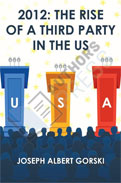
 |
In this book, readers discover an overview of America's political schisms, a critique of the federal government's overreach, and an explication about excessive taxation. The book opens with a keen observation that pinpoints the beginning of America's current political polarization: "In the 2008 primaries and through the general election, it became clear that a growing percentage of Americans were not happy with the two candidates who emerged to represent their parties." The book then closely examines the bank bailouts that led to the 2008 economic downfall, which has left the American economy struggling ever since. Throughout the book, readers not only find critiques and overviews of the problems plaguing America's economic and two-party political system, but they also find potential solutions to the problems that could ultimately result in a fairer economic and political system for all Americans, not just the "ruling class of government."
Readers might, at first, think that the author is laying the groundwork for advocating the Libertarian Party. However, throughout the book, the third party remains unnamed. Instead, the book advocates for severely limited federal governmental powers and more reliance on state and local governments to do what's best for their citizens. The book establishes that "There is a unique opening for a party to emerge with a simple message of small, limited government in Washington D.C." This one statement then drives the rest of the book, which focuses on how the federal government and its continual overreaches are becoming a desired flavor of the past. The book makes the appeal that for America to return to its former economic stability, the federal government must undergo a significant downsizing: "By shutting down most of the Federal Government we would be offering the way to a balanced budget, paying down the national debt and low taxes for all. The feared IRS would be shut down. Government assets in the trillions of dollars would be sold off." Uniquely, the book concludes by hosting a series of quotations from significant American leaders and cultural icons, including Patrick Henry, Samuel Adams, Mark Twain, and Ronald Reagan.
Those intrigued by the idea of a limited government will find this book interesting, especially in its exploration of what ideals the American forefathers offered regarding government's roles in citizens' lives. Brief but informative, like Thomas Paine's pamphlet mentioned in its introduction, this book is also an insightful read that informs readers about the vast wealth that the federal government holds in assets, as well as the vast power the federal government maintains over Social Security, which could ultimately cripple future generations. This book embraces the individualist spirit, and it offers readers a fresh perspective by kindling the flames of individualism and self-reliance. The book also advocates the idea that America has progressed significantly in the last 100 years, and, therefore, America's tolerance of individualism is more prevalent and evident than ever. This book is a must-read for those specifically interested in constitutional rights and the federal overreach of those rights. For those wanting to explore America's original founding ideals, this book is also a powerful primer.
A 2022 Eric Hoffer Book Award Category Finalist